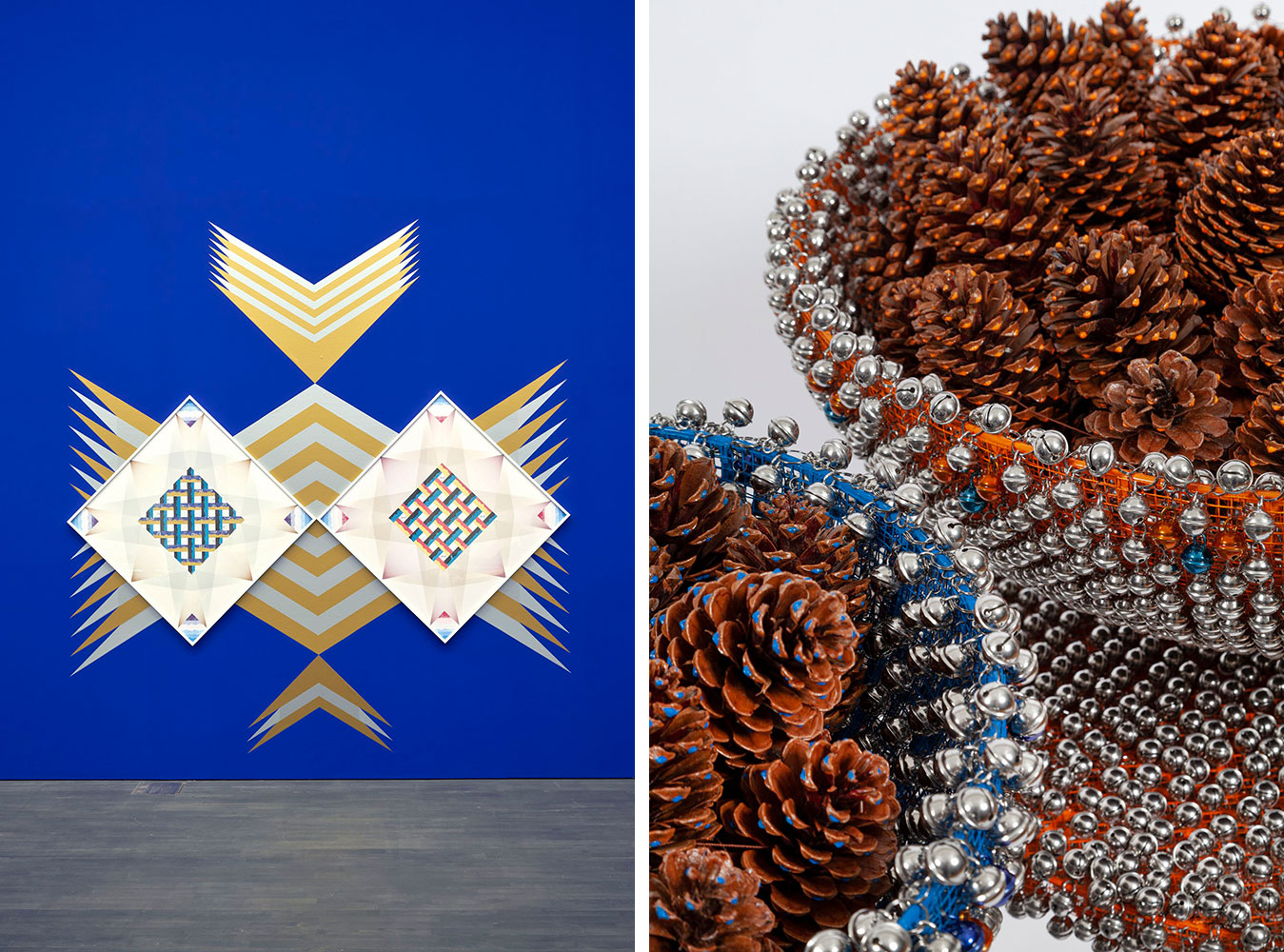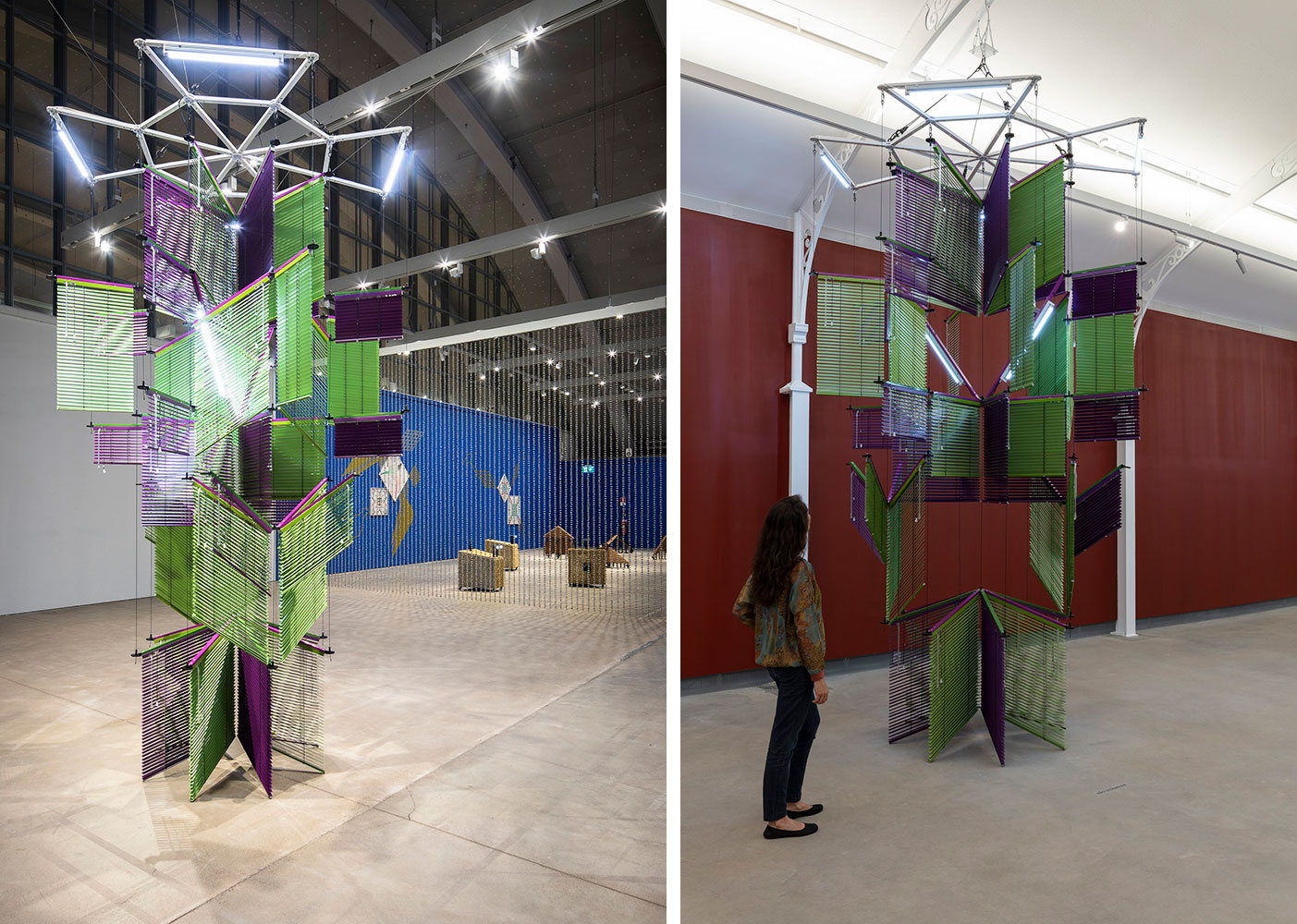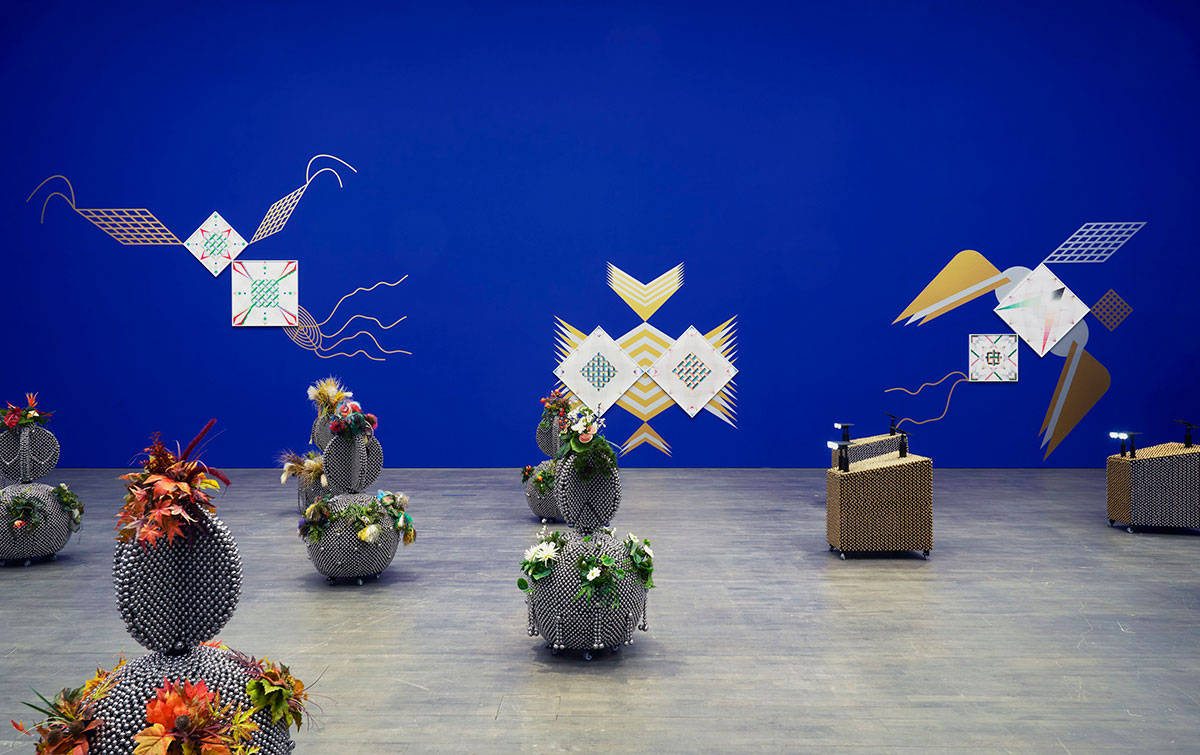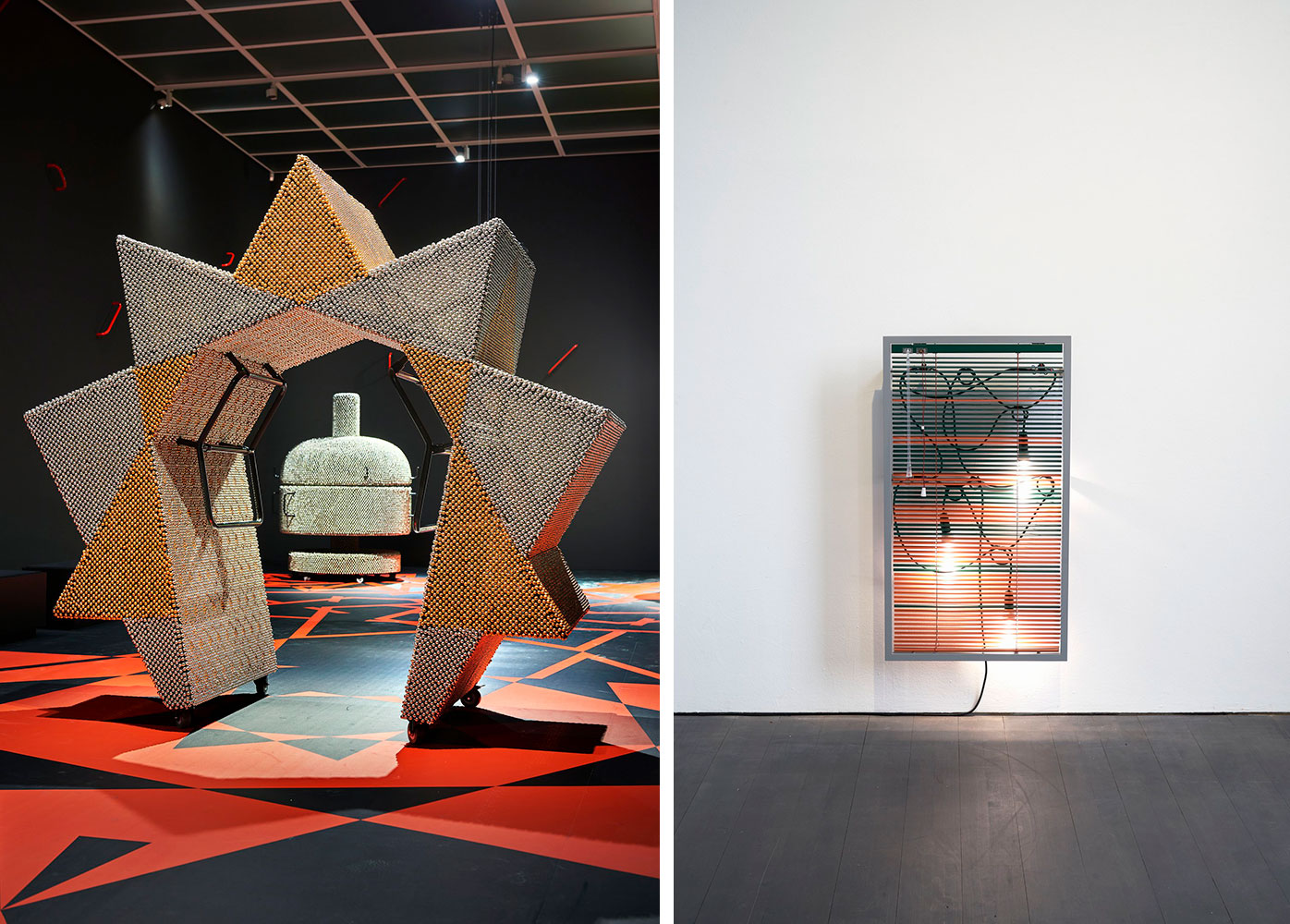ART CITIES: Helsinki-Haegue Yang, Part II
 Dividing her time between Germany and Korea since the mid-1990s, Haegue Yang has been gathering inspiration from a wide range of social, historical, and cultural environments. Her relentless curiosity has led to philosophical inquiries into diverse fields, including socio-political narratives, scientific phenomena, and anthropological perspectives, positioning her at the forefront of the contemporary art world today (part II).
Dividing her time between Germany and Korea since the mid-1990s, Haegue Yang has been gathering inspiration from a wide range of social, historical, and cultural environments. Her relentless curiosity has led to philosophical inquiries into diverse fields, including socio-political narratives, scientific phenomena, and anthropological perspectives, positioning her at the forefront of the contemporary art world today (part II).
By Dimitris Lempesis
Photo: HAM Archive
Haegue Yang’s “Continuous Reenactments”, her first solo exhibition in Finland, is built around the themes of recurrence and reenactment. Seemingly oppositional notions – such as abstraction and figuration as well as domesticity and public – are paired, and thus revealed to be as inseparable. Yang builds a playfield for investigating the ideas of doubling, mirroring, and reiterating, which are manifested here through (a)symmetrical pairs, complementing duos, and interconnected groups of artworks. By including reenactments of her previous artworks, she creates an immersive exhibition with performative and sonic elements, driven by conceptual insight and an abundance of visual references. The color red defines the south hall. It appears in the objects on the wall to the taping on the floor, as well as in the “Quasi-Iron Oxide Red” wall paint, an earthy red shade found in many cultures but thought of locally as “our own”. The space is populated by the monumental Handles, an installation comprising six sculptures, which borrow their form from diverse sources including Western avant-garde art, handles as everyday user interfaces, and spiritual geometry. Hung on the opposite walls of the hall, “Jahnstraße 5” similarly addresses domestic household appliances, as its title stems from Yang’s former residence in Berlin, evoking the home as an intimate space and birthplace of radical thought. The intense blue wall color of “Quasi-Yves Klein Blue” articulates the north hall. Floating against this allusion to the legacy of the Western art canon are Yang’s “Trustworthies” paper collages, which merge abstract and geometrical aesthetics with organic figuration. A rich, waist-high sculptural field unfolds horizontally in “Warrior Believer Lover – Version Sonic”, a large group of sculptures depicting diverse bearers of culture and a reenactment of “Warrior Believer Lover” from 2011. Rising vertically as a counterpart is “Stacked Corners”, a pair of sculptures distinguished by their impressive scale and architectural composition. The northern hall is divided by “Sonic Droplets – Steel Buds”, a wide metallic bell curtain that is activated by the viewer to release a rattling sound that has carried significant spiritual resonance since ancient times. For the exhibition Yang has produced a new pair of “Mesmerizing Mesh” collages, featuring compositions that revolve around a single Chinese character, “Heuni”, referring to being blessed by joy. When the character is doubled, it becomes “ Heui”, which signifies a big, joyful celebration. Pictorial elements and hanzi, an ancient logogram for the Chinese language dating back over 3,000 years, are united in this composition. This most recent variant of “Mesmerizing Mesh” references the Korean folk tradition of letter painting, in which Chinese characters are drawn and richly embellished with symbols. In contrast to the intellectual emphasis of the art of the aristocracy, in letter paintings, the border between concept and form appears to be fluid. They are as holistic as indigenous shamanistic props, which highlight their rootedness to the people and earth through flora and fauna motifs. “Handles” is a multisensory installation consisting of six sculptures mounted on casters and covered in skins of bells, with wall, floor, and sound components. Hybrids of human and technical beings, the sculptures generate a subtle rattling sound when manoeuvred by activators, recalling the use of bells in shamanistic rites. The title, “Handles”, directs our attention to the ordinary object that we grasp when attempting to open or close something. The subtitles and forms of each sculpture refer to either a prominent figure of the European avant-garde, such as the artist Sophie Taeuber-Arp and the mystic philosopher G. I. Gurdjieff or an open-source door handle design. On the floor underneath the sculptures, a kaleidoscopic pattern composed of red triangles unfolds, and the walls are adorned with numerous red grab bars. An audio element recorded in the demilitarised zone (DMZ) between South and North Korea during the third inter-Korean summit in 2018 accompanies the installation. Instead of documenting the private conversation between the respective countries’ leaders, the recording only captured the chirping of birds and the clicking of camera shutters. When Handles is activated, the space is filled with “Images” (1968), a musical piece by the late South Korean composer Isang. “Stacked Corners” refers to “Espaços Virtuais: Cantos”, a serial artwork created in the 1960s by Brazilian conceptual artist Cildo Meireles. Meireles’ series consists of pieces scaled to life-sized room corners, partly resembling paintings and partly sculptures. His use of color and geometry alludes to the real space and memories in a domestic environment. Yang’s trip to Sao Paulo and Rio de Janeiro in 2006 marked a significant moment in her mapping of art history and the art world. While she was aware of artists and artistic movements in Brazil, she became more conscious of their prominence and influence on modern and contemporary art. This realisation coincided with her first use of venetian blinds, which has become known as her signature materiality and a hallmark of her artistic expression addressing the theme of permeability. Alluding to the private sphere, venetian blinds are certainly not a traditional or typical art material; they are familiar, functional objects used for dividing space, blocking movement, or restricting the viewer’s line of sight in various built environments. Yang mobilises them to address the relation between the subject and the other. Her various compositions and combinations of blinds refer to diverse (art) histories, such as minimalism and the superimposing Western notion of art. Consisting of over 100,000 specially designed stainless-steel bells in an elongated shape resembling a flower bud with five petals, “Sonic Droplets – Steel Buds” serves as a translucent divider. Ambient sonic rituals are created in the exhibition space by the rattling sound it produces as visitors walk through the artwork and activate it. For “Quasi-Yves Klein Blue”, Yang conceived a process to achieve a certain tone of blue that alludes to the iconic International Klein Blue (IKB). This shade of blue is a synthetic rendition of the distinguished blue hue for which Yves Klein (1928–62) patented the formula in 1960. Klein’s distinctive colour is based on the ultramarine blue pigment derived from the exquisite lapis lazuli stone. To obtain “Quasi-Yves Klein Blue”, the hosting institution or gallery conducts an informal poll among the employees to choose the shade closest to IKB from among the prepared colour chips of local paint suppliers. The premeditated failure to emulate the authentic iconic blue is masked behind the provocatively designed and seemingly democratic process of colour selection. This process also evokes questions about the idea of a traditional canon of Western art, prompting us to critically reflect on the concept of authenticity
Photo left: Haegue Yang, Owl Glow – Trustworthy #254, 2015. Installation view of Haegue Yang: Several Reenactments, S.M.A.K., Ghent, 2023. Courtesy of the artist. Photo: Dirk Pauwels. Photo right: Haegue Yang, Sonic Pine Spells, 2023 (detail). Courtesy of Galerie Chantal Crousel, Paris. Photo: Studio Haegue Yang
Info: Curators: Kati Kivinen and Sanna Tuulikangas, HAM (Helsinki Art Museum), Eteläinen Rautatiekatu 8, Helsinki, Finland, Duration: 24/1/2023-7/4/2024, Days & Hours: Tue 10:00-17:30, Wed-Sun 11:30-19:00, www.hamhelsinki.fi/


Right: Haegue Yang, Stacked Corners – Towering Five-Tiered Green and Purple Octagon, 2022. Installation view of Haegue Yang: Quasi-Colloquial, Pinacoteca de São Paulo, 2023. Courtesy of the artist. Photo: Isabella Matheus


Right: Haegue Yang, Jahnstraße 5 – Kitchen Radiator, 2017. Installation view of Haegue Yang: Several Reenactments, S.M.A.K., Ghent, 2023. Courtesy of Galerie Barbara Wien, Berlin. Photo: Dirk Pauwels



